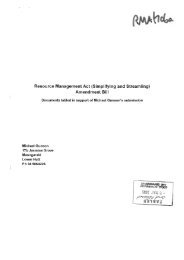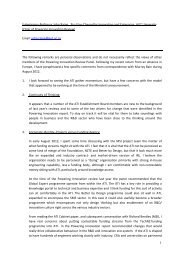Parliamentary Debates (Hansard) - New Zealand Parliament
Parliamentary Debates (Hansard) - New Zealand Parliament
Parliamentary Debates (Hansard) - New Zealand Parliament
Create successful ePaper yourself
Turn your PDF publications into a flip-book with our unique Google optimized e-Paper software.
3678 Local Government (Auckland Reorganisation) Bill 16 May 2009<br />
John Key and Mr Rodney Hide have admitted in this Chamber that they have no idea<br />
how much their sham version of the super-city is going to cost.<br />
TIM MACINDOE (National—Hamilton West): I move, That the question be now<br />
put.<br />
CATHERINE DELAHUNTY (Green): Tēnā koe, Mr Chairperson. Tēnā koutou<br />
katoa. I stand to support Labour’s position on new Part 5 of the Local Government<br />
(Auckland Reorganisation) Bill, but also I tautoko Mr Hone Harawira’s comments. We<br />
stand here under Te Tiriti o Waitangi. Our rights do not come from multiculturalism;<br />
they come from te Tiriti. Although we acknowledge the multiple cultures of Aotearoa,<br />
the first point is the difference between mana whenua rangatiratanga and minority need<br />
for representation. Any legislation in this House should be passed on that basis,<br />
recognising the value of mana whenua, first-nation people first, then recognising the<br />
diversity that Auckland undoubtedly has.<br />
The other main problem with this bill is its capacity to reinforce a trend that has been<br />
dominating local government since its inception in Aotearoa. I have named this TMPM<br />
syndrome—“Too Many Pākehā Men” in positions of power syndrome. Local<br />
government in Tāmaki-makau-rau and throughout the motu is already cursed with<br />
TMPM syndrome, with current and historical dominance of Pākehā men just about<br />
everywhere we look. This is not an attack on Pākehā men. I have lived with two of<br />
them, though not at the same time. Members should not get me wrong: I value my<br />
Pākehā men very deeply, especially the current one. However, I think for Pākehā men a<br />
minority experience in a decision-making process would be a salutary lesson because<br />
unless one has experienced marginalisation as a minority in the decision-making<br />
process, one has no idea what one is talking about or what it feels like.<br />
What is the problem with TMPM and local government? If we are to have<br />
representative democracy, which is not necessarily the only way we can do things in the<br />
Pacific, it should absolutely be representative. In addition, we must acknowledge mana<br />
whenua and the three Māori seats as recommended by the Royal Commission on<br />
Auckland Governance. To my knowledge there is no local authority district in Aotearoa<br />
where two-thirds of the community is Pākehā men, yet 90 percent of local councils<br />
Pākehā men. Fifty percent of all communities are women, and many other cultures are<br />
well represented in most communities, but we will not see them on local authorities<br />
except in corners desperately trying to be heard.<br />
Mr Rodney Hide’s bill exacerbates the problem we have with TMPM syndrome.<br />
There will not be a choice to stand for the super-city council. An “at-large” voting<br />
system is about the money needed to establish name recognition before one can start to<br />
have a chance. That fact immediately marginalises tangata whenua and other people in<br />
the city. The system is also not about numbers. Even if Pākehā men were the majority,<br />
councils would still need to represent different perspectives. Tāmaki-makau-rau needs a<br />
vibrant system of participatory local government that uses creative techniques of<br />
engagement with the diversity of communities, whilst staying based on Te Tiriti o<br />
Waitangi. Māori are not a stakeholder to be consulted, but are the first nation, with<br />
whom we Pākehā—and I am speaking for the Green Party, which is predominantly<br />
Pākehā—via the Crown, need to negotiate relationships based on the article signed on 6<br />
February 1840. Te Waiōhua have made a claim to the Waitangi Tribunal, and hence the<br />
Māori Party, the Greens, and Labour are calling for the Prime Minister to support the<br />
recommendations of the royal commission on this issue. There will be a hīkoi, and we<br />
will support it with weary hearts as yet again the Crown pays lip-service to the Tiriti<br />
relationship but gatekeeps the actual political process.<br />
Unsurprisingly I expect to hear proponents of this bill say that if people want<br />
diversity in the super-city then they can vote for it, and if they want Māori seats they






![Full evidence text [PDF 8908k] - New Zealand Parliament](https://img.yumpu.com/14025494/1/184x260/full-evidence-text-pdf-8908k-new-zealand-parliament.jpg?quality=85)
![−3 JUN 2009 IRELEASED] - New Zealand Parliament](https://img.yumpu.com/12829724/1/185x260/3-jun-2009-ireleased-new-zealand-parliament.jpg?quality=85)
![Full paper text [PDF 3515k] - New Zealand Parliament](https://img.yumpu.com/11267192/1/184x260/full-paper-text-pdf-3515k-new-zealand-parliament.jpg?quality=85)


![Full evidence text [PDF 9k] - Parliament](https://img.yumpu.com/7938085/1/184x260/full-evidence-text-pdf-9k-parliament.jpg?quality=85)





